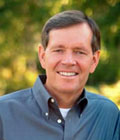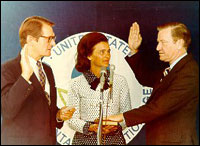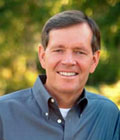
Mike Leavitt — how long will he be smiling?
Photo: Utah governor’s office.
There has been considerable adverse comment from the environmental community about President Bush’s nomination of Utah Gov. Michael Leavitt (R) to head the U.S. EPA. Most of that criticism has focused on the governor’s environmental record in Utah, a record that appears to have both positive and negative elements. That he has been concerned about growth issues is certainly to his credit. I personally believe, however, that while Leavitt’s record should receive careful scrutiny, the central issue today is not so much the environmental record of the nominee as the record and ongoing intentions of Bush and his administration in relation to the environment overall and to the EPA in particular.
The last EPA administrator, Christie Whitman, had a very decent environmental record as governor of New Jersey, particularly in the protection of open spaces. And I think she did her best at the EPA. However, my sense is that, from the beginning of the Bush administration, the White House has constantly injected itself into the way the EPA approaches and decides the critical issues before it. The agency has had little or no independence. I think that is a very great mistake, and one for which the American people could pay over the long run in compromised health and reduced quality of life.
The U.S. EPA came into being in December 1970 as the result of President Nixon’s initiative, taken under the executive reorganization authority that the president then possessed. Congress could reject the plan but not alter it. There was considerable debate at the time as to how executive authority over the environment should best be organized. Back then I was the first chair of the president’s Council on Environmental Quality, and later the nation’s second EPA administrator, and I played a central role in those discussions. (I recount the history of the creation of the EPA as well as of the many other environmental issues of the time in my book, Politics, Pollution, and Pandas, forthcoming from Island Press this November.)
The White House initially favored the creation of a new Department of Natural Resources that would have been, in effect, a greatly expanded Department of the Interior and would have handled all the functions that eventually were taken on by the EPA. Those functions included air pollution control, water pollution control, solid waste management, the regulation of pesticides, herbicides, and so forth, and the setting of environmental radiation standards.

The author (right) being sworn in as EPA administrator.
Photo: EPA.
I — and, of course, others, particularly in Congress — believed that to put the proposed EPA responsibilities into the natural resources conglomerate would be a serious error. Among other considerations, such an arrangement would create a built-in conflict between environmental responsibilities and such other responsibilities of the enlarged department as mineral and energy development and dam construction. I testified at the time before the president’s reorganization council — the Ash Council, named for Roy Ash, its chair — and I urged the creation of a new independent agency in the executive branch. Particularly at a time of burgeoning public concern over the environment, it was important that the federal government’s environmental responsibilities be exercised by an agency that had a clear focus, a “sharp cutting edge” as I called it — an agency without significant conflicts of interest inherent in its structure. To Nixon’s credit, that was the route he took, despite the opposition of powerful members of his cabinet.
From its beginning under the leadership of William Ruckelshaus and during the remaining three-plus years of the Republican administrations of Presidents Nixon and Ford while I was EPA administrator, I believe the agency fully lived up to its responsibilities to the public as an independent agency in the executive branch charged with protecting the nation’s environment. I honestly believe we carried out those responsibilities, as mandated by various environmental statues enacted with overwhelming bipartisan support in Congress, such as the Clean Air Act and the Federal Water Pollution Control Act, with the public interest as the overriding determinant of our decisions. That may sound a bit “holier-than-thou,” but it happens to be true. Of course, one cannot be in government without being exposed to political pressures of one kind or another, but we largely succeeded in fending those off.
In all my time at the EPA, I don’t recall any regulatory decision that was driven by political considerations. More to the present point, never once, to my best recollection, did either the Nixon or Ford White House ever try to tell me how to make a decision.
That is not to say that the White House wasn’t interested. On one occasion, when the EPA was about to issue regulations concerning lead in gasoline, I got a call from Melvin Laird, then chief of staff to Ford (and later Secretary of Defense), who told me the White House was receiving a lot of complaints from the oil and auto industries over the EPA’s proposed action. Laird asked whether those industries had had a full opportunity to express their views to the agency and I said they had. He then asked whether we had taken those views fully into account. I said we had. And with that, Laird said that was all he needed to know. That was the end of the matter.

Smog-spewing traffic in L.A., circa 1973.
Photo: EPA.
On another occasion, Ford asked me to meet with him and other members of his administration to explain the substance of a decision covering auto-emission controls that I planned to announce the next day. Present were several members of the cabinet, as well as Alan Greenspan, then chair of the Council of Economic Advisers. The country was in an economic recession at the time, and there was understandable concern over the economic impact of the proposed EPA action. At the outset, Ford stated that there would be absolutely no effort to influence my decision at the meeting. Its purpose was simply to reach a clear understanding of the EPA decision. He meant that and he stuck to it. We had a full discussion but that was that; I proceeded to issue the regulation as planned.
These are small anecdotes, but they illustrate how radically we have moved away from regulation based on independent findings and professional analysis of scientific, health, and economic data by the responsible agency to regulation controlled by the White House and driven primarily by political considerations.
The U.S. EPA has been muzzled on the issue of global climate change; its independent appraisal of the airborne health threats from the World Trade Center disaster of Sept. 11, 2001, was apparently altered by White House spin artists. Its recent decision to give indefinite time to coal-fired energy plants to comply with the Clean Air Act appears to have been made under White House pressure. (Given that the act has been in effect since 1970, one would think those plants would have had ample time to get into compliance.) Two of the top EPA officials associated with the issuance of that regulation are reported to have now left the agency to work, in one case, for the nation’s second largest coal-using energy company and, in the other, for a principal industry lobbying firm in Washington, D.C. Such actions do not build much confidence in the integrity of the regulatory process. Such cases reflect a steady erosion of the public interest.
I understand that Congress is now moving to give the EPA Cabinet rank as a department, and if that happens, Bush will doubtless hail such department status as a great environmental achievement of his administration. I once supported such a move as being commensurate with the importance of environmental issues. Today, however, I believe that putting the head of the EPA in the Cabinet will serve purely and simply to further politicize our environmental protection policies.
The real issue facing us today is not the environmental record of Michael Leavitt. The real issue is whether Congress and the country will stand idly by to watch the continued weakening of the EPA by the Bush administration and its steady unraveling of the environmental protection programs that have been a crowning achievement of the United States in recent history.



